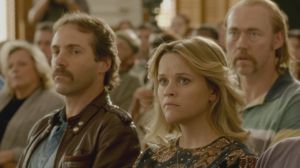The trial against the West Memphis Three is considered to be one of the worst miscarriages of justice in contemporary American history. The efforts by police officers and prosecutors to pin a heinous triple-murder on three teenage metal-heads, and spin it as part of a Satantic ritual, took an extra-special kind of lazy, simplistic and sensational storytelling. Actually, it's pretty much the same kind used to make Devil's Knot.
This is a story that has already been masterfully explored and exposed in three separate documentaries by Oscar-nominated directors Joe Berlinger and Bruce Sinofsky (not to mention numerous other films). So influential was their Paradise Lost trilogy, that their films actually changed the course of the re-trials over the years. Not only are those filmmakers portrayed by actors in this film, they even make special appearances. They did the hard fact-finding work that hired legal guns like you, simply didn't have the man-power to handle. Which also feels like a pretty apt metaphor for the way Canadian auteur Atom Egoyan ended up directing this Hollywood production: well intentioned, but as shamefully overwhelmed by the material as the state-appointed defense team.
See, what makes this story so insane is that almost every adult male figure around the three murdered boys seems to have more evidence against them than the accused. But these revelations took years to uncover, and are just some of the addendums saved for the film's long end titles. So, instead of depth and complexity, we only get the cliched movie-of-the-week treatment of the murders and trial.
Starting off on a serene summer evening, one of the boys angelically asks Reese Witherspoon (in full Southern-mom-mode) to go for a bike ride. She snarls a typical "don't come home late or else" threat and then lovingly looks on as her 8-year-old boy rides off with two friends. Slowly but surely, we get to the missing people report, the frantic search, and the grisly discovery - treated with the most matter-of-fact pacing and "good enough" cinematography. Meanwhile, Colin Firth participates in the film's wasting-of-talents by playing a side-lined special legal assistant / passionate pest to the defense team (you'll have to explain those muddled politics to me later), who really does nothing but shake his head in disgust as the proceedings turn into a kangaroo court. It all makes for an epic yawn of a picture that completely fails to capture the legal labyrinth and true mystery behind the drama. The film never even comes close to finding the dark and plodding treatment of David Fincher's Zodiack or master-craftsmanship of Denis Villeneuve's similarly-themed Prisoners.
Even worse, Egoyan only makes token attempts to employ his own strengths and interests, such as exploring how video recordings change a person's behaviour and shape their memory. You couldn't find a more fertile true story for such subject matter, but instead, Egoyan just robotically recreates the iconic moments caught on video, such as when Damien Echols looks defiantly into the camera through his jet-black hair while in the back of a police car, or the nearly incoherent rantings of father Terry Hobbs outside the courtroom. Legally speaking, it all feels a lot closer to lazy copyright infringement than embracing a director's trademark strength.
You know it's bad when Egoyan makes his own version of an Alford Plea at the Toronto premiere, admitting that it's "not really an Egoyan" film. That kind of half-ass effort is what lead to this whole legal debacle in the first place, and it once again feels like laziness real villain here.
Getting out while I can,
Christopher







